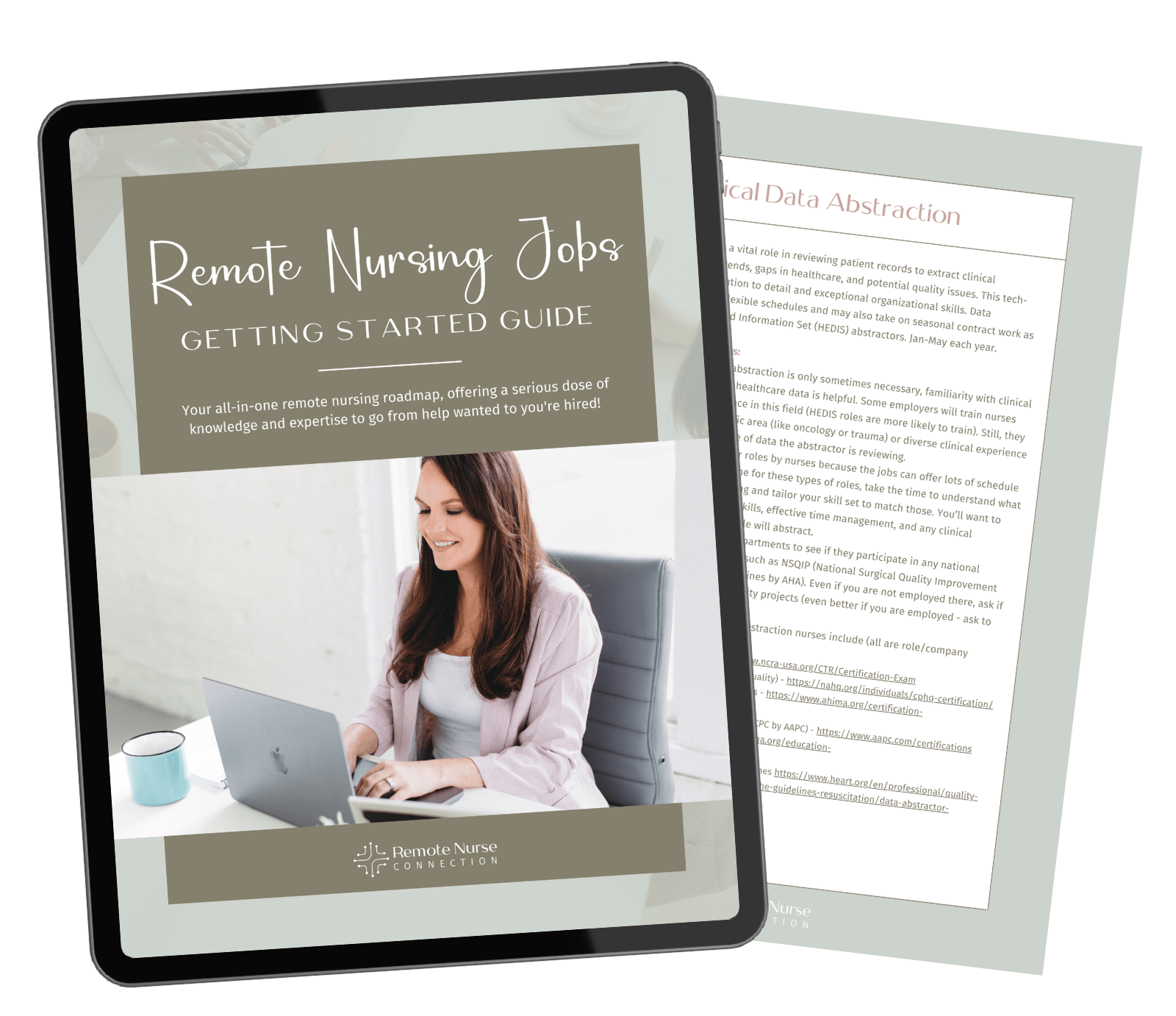
Navigating the nursing compact state licensure process can feel overwhelming, especially for remote nursing roles, but understanding how it works can simplify your job search and open up more opportunities.
When I took my first travel nursing contract in the early 2000s, I remember the mixed emotions of excitement and paperwork stress. Back then, getting licensed in a new state was a whole process. Some states made it easier than others, but it always meant another application, another fee, and more hoops to jump through. I vividly recall the walk-through states where you could show up with your documents and walk out with a temporary license the same day. But for most states, it wasn’t that simple.
At the time, compact licenses weren’t nearly as widespread, so applying for single-state licenses could feel overwhelming. Each new contract brought a new stack of forms and weeks of waiting. Thankfully, things have changed (for the better!) with the Nursing Compact License (eLNC). Today, understanding what a compact nursing license means, especially for remote nursing jobs, can give you a huge leg up in your job search.
Let’s break it down in a way that makes sense, tackle some common myths, and show how both compact and single-state licenses can open doors for remote nursing opportunities. Whether you live in a compact state or not, there are paths to landing remote roles, and we’ll go into detail on how to navigate them.
What Is a Nurse Compact License (NLC)?
The Nursing Licensure Compact (eNLC) allows nurses to hold one multi-state license that enables them to practice in all participating compact nursing states without needing separate single licenses for each state. Think of it as your nursing passport, allowing you to cross state lines without extra paperwork. The terms compact license and multistate license are often used interchangeably, referring to the same type of license that allows cross-state practice within compact states.
The compact status applies to Registered Nurses (RNs) and Licensed Practical Nurses (LPNs) who are legal residents of a home state that participates in the compact agreement and has met the licensure requirements. Unfortunately, Nurse Practitioners (NPs) aren’t eligible for the eNLC yet, though there is an ongoing discussion about an APRN compact. Vivian Health has a great article here about applying for single-state licensure by endorsements for NPs.
For up-to-date information, including a map of compact states and FAQs, the best source of truth is nursecompact.org. They have everything you need to know about which states are part of the compact, pending legislation, and all details on any new states joining the agreement.
Nursing Licensure Compact (NLC) States in 2025
As of now, there are 43 states in the compact. Here’s a quick breakdown:
- Alabama
- Arizona
- Arkansas
- Colorado
- Connecticut – NLC enacted, Awaiting implementation, Full Implementation Date TBD
- Delaware
- Florida
- Georgia
- Guam – Partial implementation; Full Implementation Date TBD
- Idaho
- Indiana
- Iowa
- Kansas
- Kentucky
- Louisiana
- Maine
- Maryland
- Massachusetts – NLC enacted, Awaiting implementation, Full Implementation Date TBD
- Mississippi
- Missouri
- Montana
- Nebraska
- New Hampshire
- New Jersey
- New Mexico
- North Carolina
- North Dakota
- Ohio
- Oklahoma
- Pennsylvania
- Rhode Island
- South Carolina
- South Dakota
- Tennessee
- Texas
- Utah
- Vermont
- Virginia
- Virgin Islands – NLC enacted, awaiting implementation
- Washington
- West Virginia
- Wisconsin
- Wyoming
States with Partial Implementation:
Currently, Guam is the only one remaining with partial implementation of the Nurse Licensure Compact. This means that while nurse residents here aren’t yet eligible to apply for a compact nursing license status, nurses from other compact states who already hold an active multistate license are allowed to practice there. You can stay up to date on the implementation progress and details by visiting nursecompact.org.
States with Pending NLC Legislation:
Both Washington D.C. and Michigan have pending NLC legislation, meaning they are in the process of considering joining the compact, but it has not been finalized.
For the latest list of compact states, check nursecompact.org, where you can also see maps showing pending and enacted states.
What Does This Mean for Remote Nursing Jobs?
Having a compact license can certainly open more doors for remote nursing jobs, but it’s not a requirement for every position. Roles like triage nursing, care coordinators, nurse navigators, and case management often involve working with patients across state lines, which is where a compact license becomes especially helpful. If you have a compact license, you’re able to provide care to patients in other compact states without needing additional state licenses.
For example, if you live in Texas (a compact state) and your employer has patients in Florida and North Carolina, you’re already covered to work with those patients without having to apply for separate licenses. This flexibility can make you a more attractive candidate for remote roles that require multi-state coverage.
The Benefits of a Compact License for Remote Jobs:
- More job opportunities for certain remote nursing roles: Remote roles that involve patient interaction, such as triage or case management, often prefer or require a compact license.
- Flexibility to work across states: Particularly valuable in roles where patients are located in various compact states.
However, not every remote nursing job requires a compact license. There are plenty of companies and hospitals looking for nurses with single-state licenses, especially if the nurse resides in the same state as the facility or the patients they serve. In fact, many hospitals prefer hiring nurses who are licensed in the states where they operate due to logistical reasons like taxes, shipping equipment, and scheduling onsite meetings or training.
What If You Don’t Live in a Compact State?
But what if you don’t live in a compact state? Are you out of luck for remote nursing jobs? Not at all! There are still ways to increase your job opportunities and make yourself more marketable to employers. While having a compact license can simplify things, many remote roles are still open to nurses with single-state licenses.
In fact, plenty of companies and hospitals are willing to hire nurses with any state license or specific state licenses that aren’t compact, especially for roles that don’t require direct patient interaction. These roles, such as utilization review, data abstraction, quality, and revenue integrity, can be excellent opportunities for nurses who don’t hold a compact license. (Check out our blog post on remote roles for introverted nurses for more details!)
If you’re looking to expand your job prospects, applying for single-state licenses through endorsement is a smart move. This strategy is often used by travel nurses to increase their options, and it works just as well for remote roles. By holding single-state licenses in key states, you make yourself more marketable for remote jobs that require coverage in those areas.
High-Demand Non-Compact States to Consider for Endorsement:
These states tend to have a high volume of remote nursing job opportunities. Employers often prioritize hiring nurses who are licensed in these states, even if the roles don’t require direct patient care.
Making Yourself More Marketable:
If you already have a compact license, you can increase your marketability by applying for endorsement single state licenses in non-compact states, as listed above. This shows potential employers that you’re ready to provide coverage in key states and makes you a more attractive candidate for multi-state roles.
The reverse is also true. If you aren’t eligible for a compact license, you can still make yourself more marketable by applying for additional single-state licenses. This strategy opens up more remote opportunities, especially in roles where U.S. residency in a specific state isn’t required. The key is to stay proactive and tailor your licensure strategy to match the types of jobs you’re targeting.
Whether you hold a compact license or are building a portfolio of single-state licenses, there are plenty of opportunities in remote nursing roles! There are also many remote nursing jobs available that will accept any US nursing license (some are limited to the contiguous 48).
Common FAQs About the Nursing Compact License
Here are some frequently asked questions about compact licenses I hear from nurses considering remote jobs:
1. Do I need a compact license to work remotely?
No, you don’t need a compact license to work remotely. However, having one makes the process easier and can open up more opportunities for certain roles that require patient interaction.
2. Can I have licenses in multiple states?
Yes! You can hold a compact license and also apply for single-state licenses in non-compact states.
3. How do I apply for a compact license?
To apply for a compact license, check your state board of nursing for eligibility requirements. Your primary state of residence must be in a nursing compact state.
For detailed instructions for each state, as well as a list of additional FAQs, visit nursecompact.org.
Final Thoughts
Licensing can definitely feel complicated, but it doesn’t have to be a barrier to landing your next remote nursing job. Whether you have a compact license or you’re piecing together single-state licenses, what really matters is how you approach your job search and position yourself for the right roles.
Think about the types of remote jobs that align with your skills and goals. Are you interested in patient-facing roles like case management? Or maybe you’re looking at behind-the-scenes work like chart review or quality assurance? Knowing the licensing requirements for those jobs and staying proactive about meeting them will help you stand out.
To make your search easier, our job board lets you filter remote nursing jobs by state, compact status, and specialty. You can quickly see roles that match your licensure and career goals without feeling overwhelmed.
At the end of the day, remember that there are remote nursing jobs for nurses in every state. The right job for you is out there – it’s about focusing on what you can control, being flexible, and taking the next step.
You’ve got this! Happy job hunting!
Browse A Bit More On the Blog…
3 Resume Mistakes Nurses Make When Applying to Utilization Review Jobs (And How to Avoid Them)
Jun 20, 2025
Writing a strong utilization review nurse resume isn’t just about ATS formatting; it’s about knowing what to say, what to leave out, and how to shift the focus from bedside tasks to clinical thinking. And for most nurses making this transition, that’s where things get...
Want a Less Stressful Nursing Job? Here’s How to Become a Nurse Data Abstractor
Jun 17, 2025
If you’ve been searching for a less stressful, flexible remote nursing job that lets you work from home and still use your clinical knowledge, you’ve probably come across roles like “nurse data abstractor.” But trying to figure out what the job actually involves or,...

Your Insider Connection to Remote Nursing Success
I help nurses find the best-fit remote jobs that bring flexibility, personal freedom and alignment, and continued professional growth.
CATEGORIES

Free Getting Started Guide
FOR LANDING A
REMOTE NURSING POSITION!


